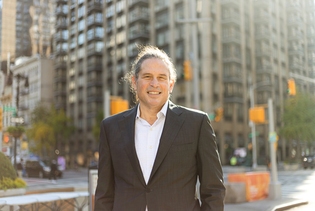
Phipps Houses
Adam Weinstein ’84 traces his interest in housing to his Yale classes with historian William Cronon ’90PhD. Weinstein is now president and CEO of New York’s Phipps Houses.
View full image
Adam Weinstein ’84 is president and CEO of Phipps Houses—the largest not-for-profit developer, owner, and manager of affordable housing in New York City. Phipps currently houses more than 30,000 low income New Yorkers, with more units in the pipeline. Weinstein also chairs Phipps Neighborhoods, the organization’s social-services arm, which runs educational and career-readiness programs for about 12,000 New Yorkers. He lives in the Bronx with his wife, Holly Leicht-Weinstein ’92.
Lenore Skenazy: Is or was there an actual person named Phipps?
Adam Weinstein: Henry Phipps. He was Andrew Carnegie’s partner. He was pretty shy, but quite adept at keeping Frick and Carnegie from killing each other.
LS: Useful skill. Did he actually build houses?
AW: He was known as sort of their finance person. But he also built some buildings and accepted a much lower return on capital—he charged low rents.
LS: It sounds like a lovely way to help people.
AW: Phipps also funded the psychiatric service at Johns Hopkins, which is known as the Phipps Clinic. And the Henry Phipps Professor of Psychiatry at Johns Hopkins is my Yale roommate, Jimmy Potash [’84].
LS: How did you get interested in housing?
AW: I can trace it back to Yale. My favorite professor was a guy named Bill Cronon [’90PhD]. He’s sort of an urban and environmental historian. I must’ve taken six or seven classes from him. He taught a seminar on the history of the city that just got me hooked. I wrote my senior thesis on the early New Haven Colony’s town plan.
LS: So after college you made a beeline for urban something or other?
AW: I found a job working in the [Mayor Ed] Koch administration in the economic development area. I was basically a gopher. My officemate was the guy who currently runs the MTA, Janno Lieber.
LS: Why New York?
AW: New York in the ’70s was a disaster. And by the mid-’80s Ed Koch mounted a big affordable housing program. That’s what got me interested.
LS: Enough to go to business school?
AW: Yes. Public policy school also made some sense, but I don’t know—it seems like you’ll run into public policy if you do anything in the real world, but policy people might never do anything in the real world.
LS: So what real thing did you do with your new degree?
AW: I tried to persuade a bunch of interesting people, including Donald Trump and Andrew Cuomo, to hire me as their affordable housing guy. A friend I’d worked with said, “You really should go talk to Phipps Houses.” And that was almost 35 years ago.
LS: I read a New York Times piece about your twenty-story Via Verde apartment complex in the Bronx that called it “handsome,” “dignified,” “green”—positively uplifting. What’s your secret?
AW: This is going to sound really pedestrian, but the big difference is a doorman.
LS: Wait, what? Don’t all housing projects have guards?
AW: Yes, [but] a guard is just, you know, a security feature. A doorman takes your package. If you have a problem in your unit, you let the doorman know. You walk into a building and chat with the doorman. It really turns it into something very different.
LS: How did you figure that out?
AW: My friend Maria, after she had a baby, moved from her East Village apartment to a building on Sixth Avenue. We went to visit, and I said, “How’s the new building?” And she said, “Oh, we know everybody!” I said, “Because you have a baby?” And she said, “No, because we have a doorman! You stop and chat in the lobby where there are people, instead of just buzzing people in.” And I thought, “That’s interesting. It does make a difference.”
 loading
loading
1 comment
-

Jed Davis , 7:32pm May 18 2024 |  Flag as inappropriate
Flag as inappropriate
The comment period has expired.So admirable.